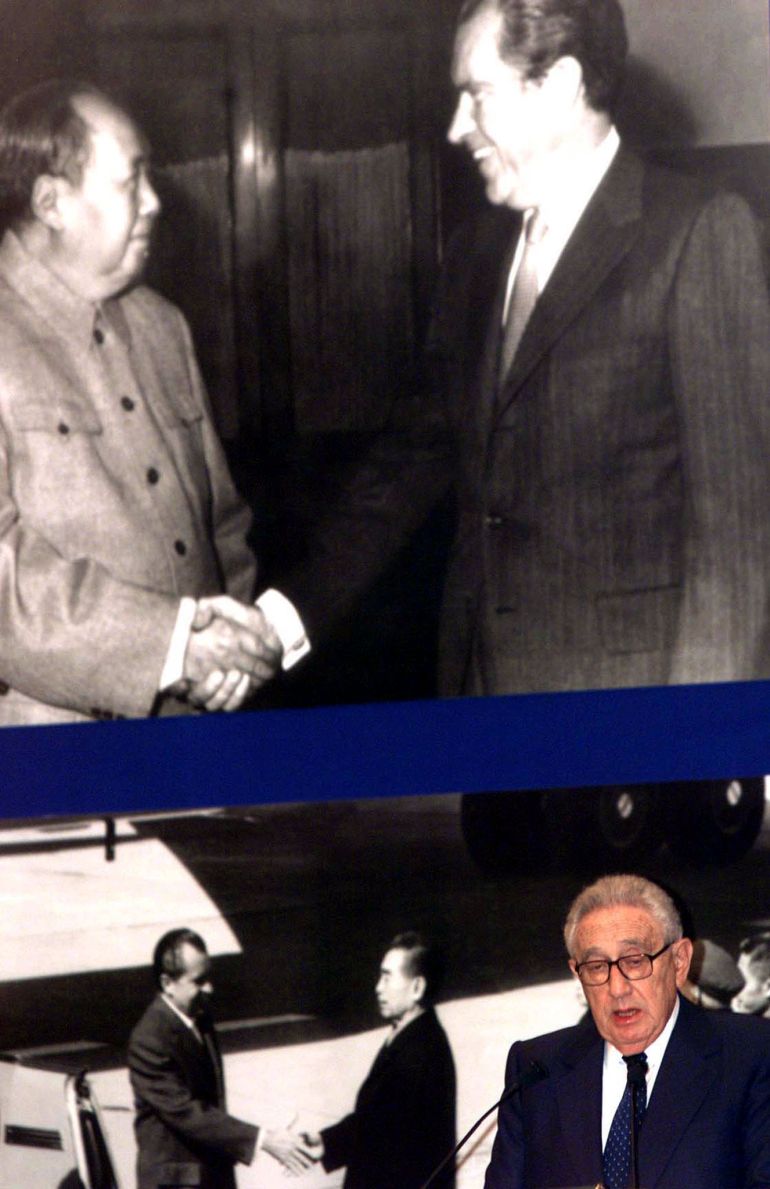An ‘enigmatic realist’ who fled Nazi Germany, Kissinger is remembered for ending the US war in Vietnam, opening China.
New York, United States – Few Nobel Peace Prize winners are called warmongers, but the gravelly-voiced, enigmatic diplomat Henry Kissinger was.
The contradictions of Kissinger, who died on Wednesday at home in Connecticut at age 100, do not end there.
An academic who became a celebrity, Kissinger was a Jewish teenager who fled the Nazis, a self-confessed “secret swinger” who dated pin-ups, a Machiavellian adviser to United States presidents who changed the course of history and a workaholic who remained active beyond his last birthday.
The debate about whether the former US secretary of state was a brainy adviser or a merciless hawk is not likely to reach a conclusion any time soon. He served in the role under two presidents: Richard Nixon and Gerald Ford, both Republicans.
Kissinger’s work on the diplomatic opening of China to the US, landmark US-Soviet arms deals and peacemaking between Israelis and Arabs are not disputed. However, his role in the Vietnam War and his support for anti-communist dictatorships, particularly in Latin America, remain divisive.
“He viewed the world from 30,000 feet, advancing broad interests and long-term goals in a way that under-appreciated the negative costs people would bear, especially those in societies that were different from the US,” Jeremi Suri, a history professor at the University of Texas at Austin, told Al Jazeera.
In 2021, at the age of 98, Kissinger co-authored a book on artificial intelligence with former Google CEO Eric Schmidt and MIT computer scientist Daniel Huttenlocher.
“Henry Kissinger at the age of 90 knew nothing about the digital world, although he had a lot of opinions about it,” Schmidt told podcast host Tim Ferris when the book was published.
“But he has mastered the digital world and artificial intelligence with the alacrity and speed of people who are just getting into it now,” Schmidt said. “That’s unique to him. It’s a gift.”
Kissinger’s son, David Kissinger, also noted his father’s unique longevity ahead of his centenary birthday bash, which was attended by current US Secretary of State Antony Blinken.
“Not only has he outlived most of his peers, eminent detractors and students, but he has also remained indefatigably active throughout his 90s,” the younger Kissinger wrote in the Washington Post in May 2023.
When questioned about Blinken’s attendance at the party, State Department spokesman Vedant Patel noted the policy “differences” between the two men. Nevertheless, he added, Blinken had had the “opportunity to engage” with the former top diplomat several times since taking office.
Kissinger’s life story has the elements of a classic US immigration success. He was born in 1923 in Furth, Germany, to devout Jewish middle-class parents. Facing a rising tide of anti-Semitism, they fled the Third Reich and settled in New York in 1938.
Kissinger served in the US Army in Germany and saw combat during the decisive and brutal Battle of the Bulge. As a native German speaker, he was assigned counter-intelligence roles and earned the Bronze Star tracking down former Gestapo officers.
He returned to the US in 1947 to start a celebrated academic career at Harvard University that led to part-time White House advisory roles under Presidents John F Kennedy and Lyndon Johnson and set him on the path of his life’s work.
A realist who chided moralising
Kissinger chided colleagues for their Cold War-era moralising and called for pragmatism. A “flexible response” to communist aggression would use conventional and nuclear weapons as a deterrent rather than threats of all-out nuclear retaliation, he said.
“He built his fame by presenting, and representing, himself as the quintessential European realist lent to an immature and naive America to teach her the harsh and immutable laws of international relations,” Mario Del Pero, a historian at Paris-based Sciences Po, told Al Jazeera.
President-elect Richard Nixon made Kissinger his national security adviser in 1968. He began reshaping Washington’s foreign policy machine, bypassing the Department of State and concentrating power in the White House’s National Security Council.

“Kissinger created a model for operating the machinery of a complex democracy to make strategic choices that lacked public support but served the national interest. He was controversial, but his realpolitik has influenced two generations of policymakers,” added the University of Texas’s Suri.
His favoured “back-channel” talks paved the way for a diplomatic opening with China and detente and the Strategic Arms Limitation Treaty (SALT I) with the Soviet Union. In foreign affairs, Washington had “no permanent friends or enemies, only interests”, he once wrote.
His biggest challenge was a Vietnam War that, by 1969, was increasingly costly, deadly and unpopular. Kissinger sought “peace with honour” by opening talks with North Vietnam while using devastating bombing campaigns to improve his bargaining power.



No comments:
Post a Comment
Note: only a member of this blog may post a comment.